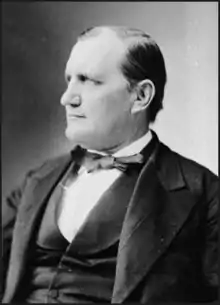William H. Forney
William Henry Forney (November 9, 1823 – January 16, 1894) was an Alabama legislator, a brigadier general in the Confederate States Army during the American Civil War and U.S. Representative from Alabama from March 4, 1875 to March 3, 1893.
William Henry Forney | |
|---|---|
 | |
| Member of the U.S. House of Representatives from Alabama's 7th district | |
| In office March 4, 1877 – March 3, 1893 | |
| Preceded by | District re-established |
| Succeeded by | William Henry Denson |
| Member of the U.S. House of Representatives from Alabama's at-large district | |
| In office March 4, 1875 – March 3, 1877 | |
| Preceded by | Charles Christopher Sheats |
| Succeeded by | District inactive |
| Member of the Alabama Senate | |
| In office 1865-1866 | |
| Personal details | |
| Born | November 9, 1823 Lincolnton, North Carolina |
| Died | January 16, 1894 (aged 70) Jacksonville, Alabama |
| Nationality | |
| Political party | Democratic |
| Profession | Lawyer |
| Military service | |
| Allegiance | |
| Branch/service | |
| Years of service | 1861 – 1865 |
| Rank | |
| Unit | 10th Regiment Alabama Infantry |
| Battles/wars | American Civil War |
Early life
Forney was born in Lincolnton, North Carolina, on November 9, 1823.[1] He moved with his parents to Alabama in 1835.[1][2] He was the grandson of Peter Forney and nephew of David M. Forney. He was the older brother of Confederate Major General John Horace Forney, first cousin of Confederate Brigadier General Robert Daniel Johnston and second cousin of Confederate Major Generals Robert F. Hoke and Stephen Dodson Ramseur.[1] Forney pursued an education in classical studies, and graduated from the University of Alabama at Tuscaloosa in 1844.[1][2]
He served in the Mexican War as a first lieutenant in the First Regiment of Alabama Volunteers.[2] Upon returning from the War, Forney studied law and was admitted to the bar in 1848 when he commenced practice in Jacksonville, Alabama.[2] Forney served as a Trustee of the University of Alabama from 1851-1860. In 1859 and 1860, Forney served as a member of the Alabama House of Representatives.[2]
Civil War
During the Civil War Forney entered the Confederate States Army in 1861 as a captain in the 10th Regiment Alabama Infantry, and was successively promoted to major on December 20, 1861, lieutenant colonel on March 17, 1862, and colonel on June 27, 1862.[1] He was wounded in the leg at the Battle of Dranesville, Virginia, December 20, 1861.[1][3] He was wounded in the right arm and captured at the Battle of Williamsburg on June 27, 1862.[1][3] He was exchanged on August 31, 1862.[1] He was wounded in the leg at the Battle of Salem Church on May 3, 1863.[1]
He was left on the field at Gettysburg with multiple wounds, captured and remained a Union prisoner of war for more than a year from July 5, 1863 to August 4, 1864.[1] Following his parole, on August 21, 1864, he was given command of a brigade in Major General William Mahone's division.[1][2] Forney was promoted to brigadier general on February 15, 1865.[1] He served as a brigade commander in Mahone's Division until the surrender at Appomattox on April 9, 1865.[1][2] He was pardoned on July 11, 1866.[1]
Aftermath: Post-War career
After the War, Forney served as a member of the State senate in 1865 and 1866. He was elected as a Democrat to the Forty-fourth and to the eight succeeding Congresses (March 4, 1875 – March 3, 1893).[1][3][4] He served as chairman of the Committee on Expenditures in the Department of the Treasury (Forty-sixth Congress). He was not a candidate for renomination in 1892.
He was appointed by President Grover Cleveland to be a member of the Gettysburg Battlefield Commission and served until his death. Forney died in Jacksonville, Alabama, January 16, 1894 and was interred in City Cemetery, Jacksonville.[1][4]
Notes
- Eicher, John H., and David J. Eicher, Civil War High Commands. Stanford: Stanford University Press, 2001. ISBN 978-0-8047-3641-1. p. 240.
- Warner, Ezra J. Generals in Gray: Lives of the Confederate Commanders. Baton Rouge: Louisiana State University Press, 1959. ISBN 978-0-8071-0823-9. p. 91.
- Sifakis, Stewart. Who Was Who in the Civil War. New York: Facts On File, 1988. ISBN 978-0-8160-1055-4. p. 224.
- Warner, 1959, p. 92.
References
- Eicher, John H., and David J. Eicher, Civil War High Commands. Stanford: Stanford University Press, 2001. ISBN 978-0-8047-3641-1.
- Sifakis, Stewart. Who Was Who in the Civil War. New York: Facts On File, 1988. ISBN 978-0-8160-1055-4.
Warner, Ezra J. Generals in Gray: Lives of the Confederate Commanders. Baton Rouge: Louisiana State University Press, 1959. ISBN 978-0-8071-0823-9.
- United States Congress. "William H. Forney (id: F000280)". Biographical Directory of the United States Congress. Retrieved on 2008-10-19
![]() This article incorporates public domain material from the Biographical Directory of the United States Congress.
This article incorporates public domain material from the Biographical Directory of the United States Congress.